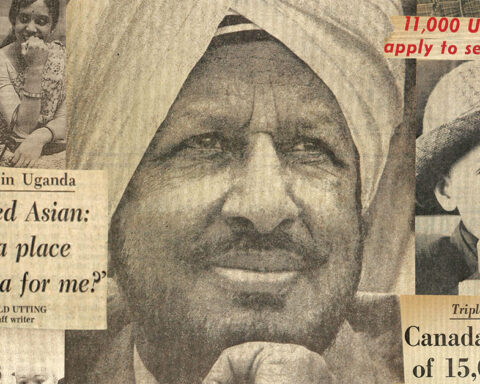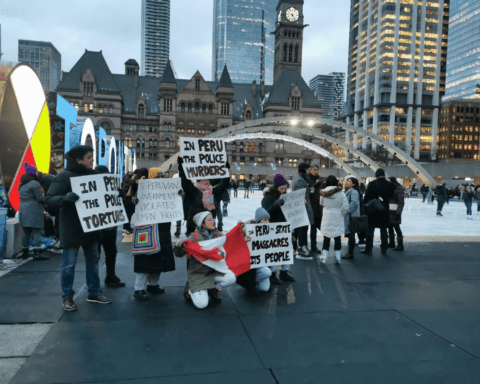The Maclean’s leaders’ debate, originally scheduled as a pre-season warmup to the election, turns out to be the first main event of the campaign. In retrospect, the Conservative brain trust may already have known the election might be called early.
The debate format in Thursday night prime time, as Maclean’s Ottawa bureau chief Paul Wells says, is “super simple.” Four leaders and Wells, as the moderator, in a closed Rogers television studio in Toronto.
There’s no panel of journalists, and no gadgets—no video questions from voters, no Facebook, Twitter, LinkedIn or YouTube. Just Wells asking questions, beginning each segment with a different leader, after which the others will jump in one at a time leading to a free-for-all. It sounds refreshingly old-fashioned.
This being Stephen Harper’s fifth national campaign, he’s by far the most experienced of the leaders in TV debates. But he also carries the liabilities of a decade in office — “the Harper decade” — as the opposition parties call it, making the point that it’s time for a change.
The lead topic will be the economy, followed by energy and the environment, institutions of democracy, foreign policy and security.
This being Stephen Harper’s fifth national campaign, he’s by far the most experienced of the leaders in TV debates. But he also carries the liabilities of a decade in office — “the Harper decade” — as the opposition parties call it, making the point that it’s time for a change.
Tom Mulcair has dominated the House of Commons as opposition leader, but this is his first real test as a prospective prime minister. His goal will be to engage with Harper, while ignoring Justin Trudeau.
The Liberal leader stands to win, relative to low expectations, just by showing up and surviving. He’s already had a good week doing what he does best, retail politics outside the Ottawa bubble.
Green Party Leader Elizabeth May wins just by being there. It may prove to be her only opportunity on the same stage. She hasn’t been invited to the Globe and Mail, Munk and TVA debates. And with the NDP walking away from the network consortium debates in October, her invitation to those two events becomes moot.
Economic downturn tops issues at hand
On the economy, Harper and his opponents will have very different bullet points. Harper will begin with 1.1 million new jobs since the end of the last recession in 2009, with Canada being the first to come out of deficit and having the lowest debt to GDP ratio in the G7. Not to mention Canada being rated the second best place in the world to do business, and our banking system rated strongest in the world the last six years in a row, to saying nothing of Canada’s gold-plated Triple A credit rating.
But those numbers are stale. With negative economic growth for the last five months, the economy is only one month shy of a recession forecast by the Bank of Canada. Based on the central bank’s mid-July outlook, the parliamentary budget office predicts a $1 billion deficit in the current fiscal year, not the $1.4 billion surplus forecast in the budget. Harper can reply that Ottawa had a $3.9 billion surplus in the first two months of the current fiscal year, but $2.2 billion of that is a one-time number from selling its General Motors shares. The numbers for June and July will include $3 billion in child care benefits mailed out two weeks ago, so there won’t be much of a surplus to report as the campaign moves on.
The opposition leaders can make a strong argument that the Conservatives should have seen the bad first quarter coming before the April budget.
From numbers to arguments, Harper will make the case, as he already has this week, that a downturn is no time to change the country’s management. In other words, the devil you know. But the opposition leaders can make a strong argument that the Conservatives should have seen the bad first quarter coming before the April budget, and could have added at least $1 billion in stimulus spending and still balanced the books.
Foreign policy, security issues also on the agenda
On energy and the environment, both issues come down to pipelines. Most notably, Trans-Canada’s $12 billion Energy East project would move 1.1 million barrels of oil per day from Alberta and Saskatchewan to the Irving refinery in New Brunswick. If we can’t diversify our markets beyond the U.S., we can’t grow them, it’s that simple.
But there is strong opposition from environmentalists and communities in Quebec, and the Bloc Québécois sees it as a ballot question.
This is a problem for Mulcair. The project meets his test of refining oil at home, but could cost him votes in Quebec. It’s not enough for him to say that the National Energy Board’s regulatory process is inadequate. Is he for or against Energy East? The prospects of an NDP beachhead in Alberta and Saskatchewan may depend on his answer.
On foreign policy and security, it’s not complicated. Harper supports the mission against ISIS, Mulcair opposes it, and Trudeau is stuck in the middle, opposing the mission but supporting the troops.
The segment on democratic institutions is the obvious opportunity for the leaders to discuss Senate reform or abolition, as well as changes to our first-past-the-post system of electing MPs. Some form of proportional representation or preferential ballots is being proposed by the opposition parties, and it would be an interesting, though hypothetical, discussion. It might also be the place for a couple of jabs at Harper on the length and cost of this election campaign.
But this segment could also provide an opening for Trudeau to take on Mulcair on his advocating the NDP’s 2005 Sherbrooke Declaration that a 50-plus-1 “Yes” to a Quebec referendum question is enough to break up the country. Is Mulcair saying he would repeal the Clarity Act of 2000, requiring “a clear answer” to “a clear question”? He can’t say one thing in French and another in English, with one message for Quebec and another for the rest of Canada.
On foreign policy and security, it’s not complicated. Harper supports the mission against ISIS, Mulcair opposes it, and Trudeau is stuck in the middle, opposing the mission but supporting the troops.
There’s nothing nuanced about Harper’s message on the “jihadist” terror threat to Canada, at home as well as abroad. It’s a fear card, pure and simple, though in a debate he might want to dial it back a bit.
It won’t be a debate with millions of viewers. For one thing, it’s the first week of August, and voters are on vacation. For another, it will be broadcast only on Rogers channels CITY and Omni, as well as CPAC, and live streamed on the Maclean’s website. And for a third, it’s up against the first U.S. 2016 Republican debate airing on Fox at 9:00 pm, an hour after ours begins.
Even so, it’s the first important occasion of the campaign, and the first important test of the leaders.
L. Ian MacDonald is editor of Policy, the bi-monthly magazine of Canadian politics and public policy. He is the author of five books. He served as chief speechwriter to Prime Minister Brian Mulroney from 1985-88, and later as head of the public affairs division of the Canadian Embassy in Washington from 1992-94.
Published in partnership with iPolitics.ca





